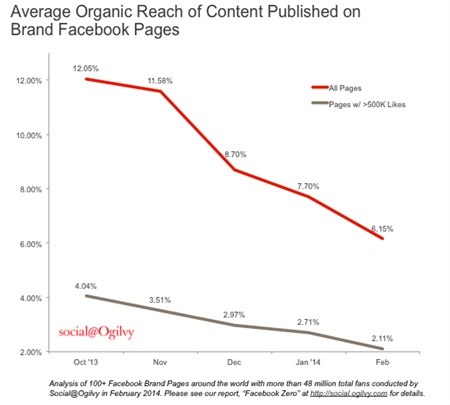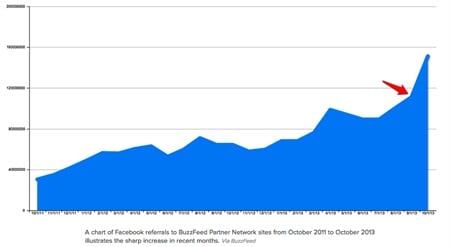Closing the divide between social and media
Some clients make use of full service digital agencies that offer both services under one roof, although these offerings are often treated as two very different services from different departments. While this approach has been acceptable thus far, the need for closer integration between these two disciplines has never been more apparent than it is at the moment.
A good example would be to look at the changes Facebook have made to their Facebook page publishing model. As part of a bigger strategy Facebook have been slowly reducing the effectiveness of organic reach as they move away from a brand syndication platform to be more performance orientated. Marketers all over the world have noticed the steady decline in reach figures for brand owned pages over the past year and this continues to accelerate.

Source: www.social.ogilvy.com
With fewer people seeing your page content it seems that Facebook have finally killed off the concept of organic reach, forming a dark cloud above the plans for brands to have their own self sustaining communities on Facebook. However this doesn't mean that Facebook itself is not a viable advertising platform.
Branded content (albeit with stronger paid media support) will continue to appear in users' news feeds and if the users find the content relevant and interesting they will share it with their friends - plus there is still a lot of value to be derived from the social endorsement and secondary reach.
The formula for delivering continued value on Facebook hasn't changed dramatically, but it required renewed focus on two key aspects:
Create great content
Although the organic reach of pages across the world has dropped dramatically, there are exceptions. These exceptions are publishers who understand the essence of what great content is. These publishers have in fact seen an increase in reach and engagement.

Source: www.buzzfeed.com
At the heart of those pages is the understanding of relevant content for specific audiences, which forms the basis for this strong engagement. Advertisers will need to start producing better, more relevant content and become a lot more selective in what they publish and promote.
Smarter use of paid media
Facebook has been continually refining its advertising options and currently offers a very robust set of targeting parameters. One of the key advantages of using Facebook paid media is the ability to select a very specific audience to display your content to. Sure, the fact that you have to pay for the reach now swings Facebook from the earned media space into the bought arena, but it allows you to ensure the quality of the audience you are reaching and enhance the relevance of your content.
In addition the fact that each piece of content will need to be carefully selected and then promoted with paid media ensures that advertisers are more selective with the content they promote, providing a better experience for consumers and potentially increasing the engagement levels.
As the social landscape continues to evolve so should our approach as marketers. In order to extract continued value from social platforms such as Facebook, advertisers need to shift from the isolated paid media and earned social media verticals to an approach where social media Community Managers work hand-in-hand with Paid Media campaign managers, to ensure that each piece of specially crafted content is matched to a custom audience and promoted using paid media.
It is important to note that this is not a situation that is limited to Facebook; the exact same situation applies to channels such as Twitter, LinkedIn and YouTube. Having these two roles intertwined will provide the most effective solution to social media marketing and increase the value that advertisers get out of their social channels.





























